While PSI is a short course, Lux Terra Leadership Foundation, on the other hand, offers a two-year Master’s program for experts who graduate and psychotherapists.
Since its inception in 2012, seven cohorts have already graduated from the Master’s Program, which is now offered at the Nairobi-based Marist International University College, a Catholic institution of higher learning affiliated to the Catholic University of Eastern Africa (CUEA). Apart from Nairobi, Lux Terra Leadership Foundation also has offices in the Archdiocese of Abuja, Nigeria.
In Kenya, the Institute has enrolled students from troubled parts of Nigeria, South Sudan, the Democratic Republic of Congo (DRC), Rwanda, Ivory Coast, Sierra Leone, and Burkina Faso, among others.
Graduates proceed to provide psycho-spiritual support to victims of attacks in their respective countries, Fr. Ehusani says.
PSI provides a master’s degree in psycho-spiritual therapy, where many Priests and women and men Religious are trained to become experts in giving psychological and spiritual support to people who are suffering in the mentioned countries.
(Story continues below)
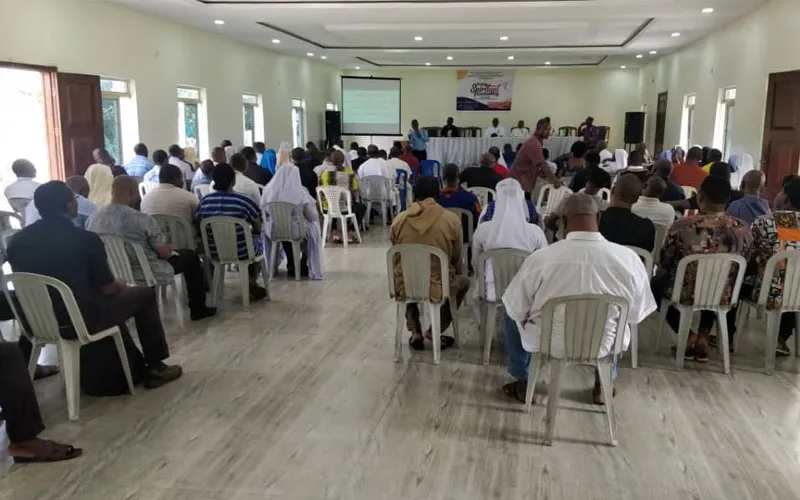 Credit: Catholic Institute of West Africa (CIWA)
Credit: Catholic Institute of West Africa (CIWA)
Fr. Ehusani told ACI Africa that the plan, since inception, was to offer the Master’s program in Eastern Africa, in Southern Africa and in Western Africa. Owing to insufficient funds, however, the two-year program has only picked up in Nairobi.
The Abuja-based Catholic Priest who is the Executive Director of the Lux Terra Leadership Foundation said the Master’s program, which requires students to stay at the institution through the entire two years, is costly, and that not many Religious Congregations can fully support their members through the program.
“We have always wanted to have many campuses across Africa. But at the moment, we only operate in Kenya. The course is very expensive since it requires our students to stay at the institution. They stay together, eat together, pray together and grow mentally before they graduate,” Fr. Ehusani told ACI Africa during the May 26 interview.
He added in reference to the course, “We acknowledge that it has only healed people that can help others to heal. And each one of us has some underlying issues from which we need to heal. Therefore, our students are taken through the healing process before anything else in the training process.”
At the campus, students are also linked to personal spiritual advisors and counselors who they talk to often. They are also organized in a support group where they embark on a spiritual journey together, Fr. Ehusani said, and explained, “The program is structured in a way that it has to be in-person. It cannot be completed online, hence the high cost.”
Fr. Ehusani recently hosted a symposium on Psycho-Spiritual Integration at the Catholic Institute of West Africa (CIWA) in Port Harcourt, Nigeria, where he explained the importance of integrating psychotherapy into spiritual care on the one hand, and integrating spirituality into psychotherapeutic care on the other.
At the end of the Tuesday, May 24 symposium, participants who included lecturers and students from both the Port Harcourt and the Obehie campuses of CIWA, expressed their desire to have the two-year Master’s Program offered in Nigeria as well.
Fr. Ehusani recognized the dearth of psycho-spiritual therapists in the West Africa country, saying, “Even here at CIWA, where there could be hundreds of students, there is only one counselor. This one counselor is not enough to handle the psycho-spiritual needs of the entire student population, let alone staff. Again, the counselor is not trained to handle all aspects of psycho-spiritual care.”
The award-winning Catholic Priest said that different psycho-spiritual therapists deal in different areas, including trauma healers, those who handle alcoholism, drug abuse, industrial needs, and forensics, among others.
He said that with Nigeria experiencing a rising number of mental challenges, the country needs “thousands” of trained psycho-spiritual therapists, including Priests to listen to confessions.
“There are people who commit the same sin over and over again and it only requires a Priest who is trained in psycho-spiritual therapy to understand that such people have some form of addiction and to give them relevant support,” Fr. Ehusani said.
The challenge, he said, includes lack of awareness on mental challenges, and lack of adequate funding of initiatives that focus on mental health.
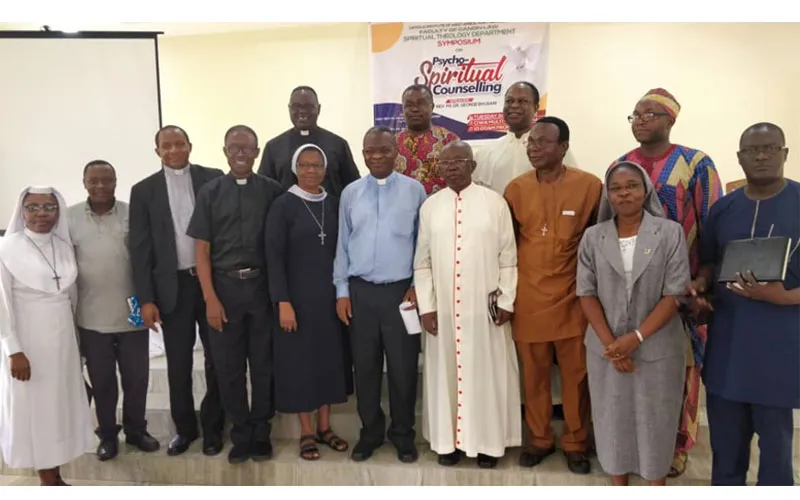 Credit: Catholic Institute of West Africa (CIWA)
Credit: Catholic Institute of West Africa (CIWA)
“Here, we have numerous foundations that support HIV/AIDS, heart conditions, diabetes, and many others. But very few foundations support the depressed, alcoholics and people suffering from substance abuse,” Fr. Ehusani said.
He underlined the need for integrating psychotherapy into spiritual care, saying, “It is difficult to cure a person’s mental wellbeing if you don’t look at their spirituality as well.”
“About 100 years ago, a lot of scientific research was done by the Church people in monasteries. It was in the context of religion that the soul was taken care of until scientists began to isolate themselves from the Church,” the Nigerian Catholic Priest said.
He added, “Today, experts recognize that spirituality plays a big role in a person’s mental well-being. Many who ignore this aspect find themselves confused between a patient’s psychological and spiritual needs.”
“At the Lux Terra Leadership Foundation, we have realized that spirituality and psychology can be studied together,” Fr. Ehusani told ACI Africa during the May 26 interview.
Agnes Aineah is a Kenyan journalist with a background in digital and newspaper reporting. She holds a Master of Arts in Digital Journalism from the Aga Khan University, Graduate School of Media and Communications and a Bachelor's Degree in Linguistics, Media and Communications from Kenya's Moi University. Agnes currently serves as a journalist for ACI Africa.



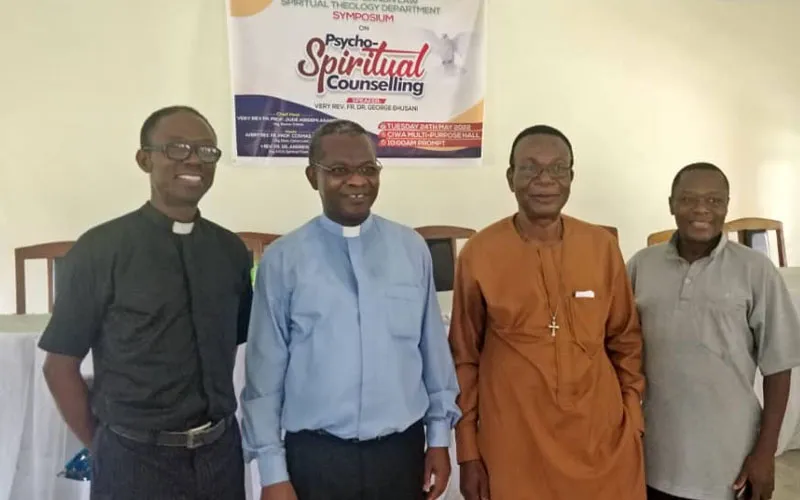
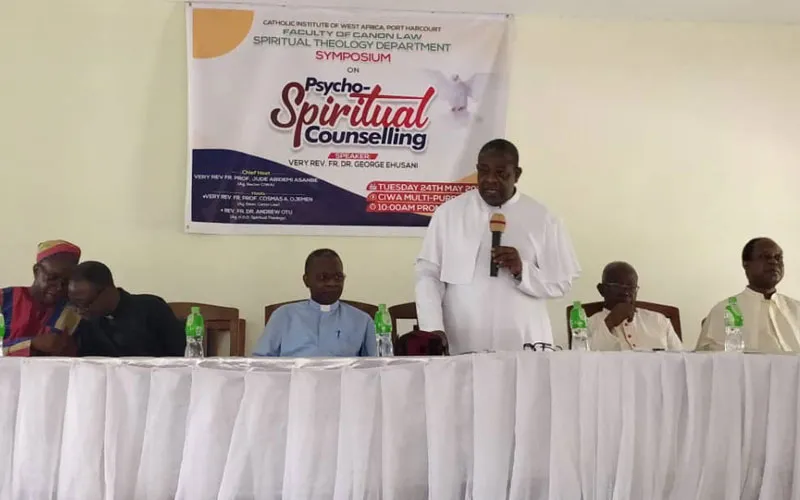 Credit: Catholic Institute of West Africa (CIWA)
Credit: Catholic Institute of West Africa (CIWA)
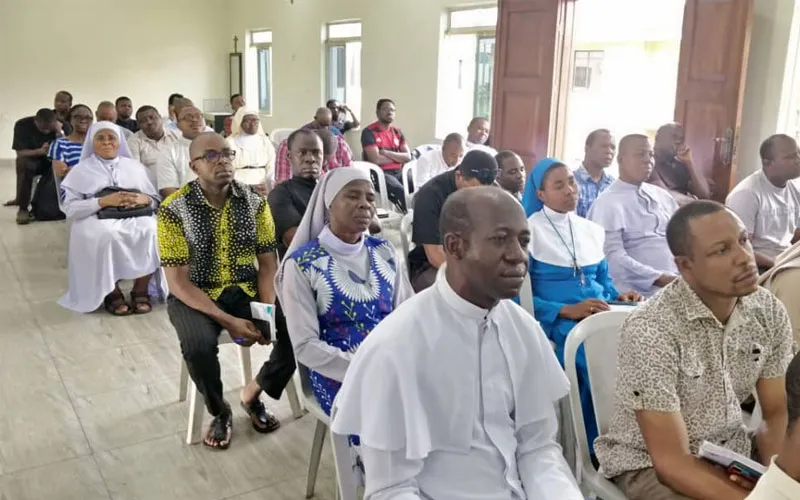 Credit: Catholic Institute of West Africa (CIWA)
Credit: Catholic Institute of West Africa (CIWA) Credit: Catholic Institute of West Africa (CIWA)
Credit: Catholic Institute of West Africa (CIWA) Credit: Catholic Institute of West Africa (CIWA)
Credit: Catholic Institute of West Africa (CIWA)


